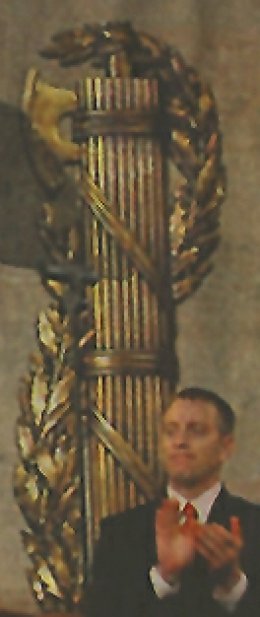New Journalism
2010-03-12 21:50:36 UTC
Did the word "faggot" come from the word "fasces"? The derogatory term
"faggot" has an obscure origin but might have originated from the word
"fagot" (a bundle of sticks) and before that from the word "fasces" or
"fascis" (a bundle of sticks symbolizing "authority" in ancient Rome),
which was the origin of the political term "fascist" and "fascism."
http://rexcurry.net/fascism=socialism.html
An eminent etymologist explains that ancient Latin used a hard c-
letter sound, so that "Caesar" was actually pronounced "Kaiser." Thus
the word "fascis" was prounonced with a hard c-letter sound, not the
modern soft c-letter sound and, thus, the older pronunciation of
"fascis" more closely resembles the pronunciation of "fagot."
Fabulous research compares a translation from the Greek writing of one
of Aesop's Fables entitled: The Bundle of Sticks. In the fable an old
man on the point of death summoned his quarreling sons around him to
give them some parting advice. He ordered his servants to bring in a
faggot of sticks, and said to his eldest son: "Break it." The son
strained and strained, but with all his efforts was unable to break
the Bundle. The other sons also tried, but none of them was
successful. "Untie the faggots," said the father, "and each of you
take a stick." When they had done so, he called out to them: "Now,
break," and each stick was easily broken. "You see my meaning," said
their father. And the meaning was supposed to be: Union gives
strength.
Images of the fasces symbol in the United States are at Congress
Loading Image...
Rome Academy School Loading Image...
The quarter coin Loading Image...
The U.S. Courts Loading Image...
"faggot" has an obscure origin but might have originated from the word
"fagot" (a bundle of sticks) and before that from the word "fasces" or
"fascis" (a bundle of sticks symbolizing "authority" in ancient Rome),
which was the origin of the political term "fascist" and "fascism."
http://rexcurry.net/fascism=socialism.html
An eminent etymologist explains that ancient Latin used a hard c-
letter sound, so that "Caesar" was actually pronounced "Kaiser." Thus
the word "fascis" was prounonced with a hard c-letter sound, not the
modern soft c-letter sound and, thus, the older pronunciation of
"fascis" more closely resembles the pronunciation of "fagot."
Fabulous research compares a translation from the Greek writing of one
of Aesop's Fables entitled: The Bundle of Sticks. In the fable an old
man on the point of death summoned his quarreling sons around him to
give them some parting advice. He ordered his servants to bring in a
faggot of sticks, and said to his eldest son: "Break it." The son
strained and strained, but with all his efforts was unable to break
the Bundle. The other sons also tried, but none of them was
successful. "Untie the faggots," said the father, "and each of you
take a stick." When they had done so, he called out to them: "Now,
break," and each stick was easily broken. "You see my meaning," said
their father. And the meaning was supposed to be: Union gives
strength.
Images of the fasces symbol in the United States are at Congress
Loading Image...
Rome Academy School Loading Image...
The quarter coin Loading Image...
The U.S. Courts Loading Image...